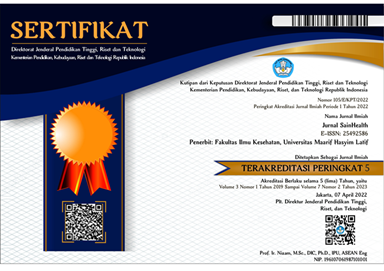EKSTRAK BUAH PEPAYA (Carica papaya L.) MENINGKATKAN KADAR CATALASE DAN GLUTATHIONE HATI TIKUS YANG TERPAPARLEAD ACETATE
DOI:
https://doi.org/10.51804/jsh.v2i1.170.8-12Keywords:
lead acetate, Carica papaya L., catalase, glutathione, miceAbstract
Pollution is an entry or inclusion living things, subtances, energy, and or other components into environment and or change of environment compositions because of human activity or natural process with the result that decrease of quality to certain level that causes doesn’t work environment. Pollution can be caused many subtances that is heavy metal, i.e. lead acetate (Pb). Lead acetate affect physiological aberration, biochemical, and behavior. Heavy metal induction induce ROS production act as destructive oxidants. Body capability to oxidant neutralize serviced by superoxyde dismutase (SOD), glutathione peroxidase (GPx), catalase (CAT), glutathione (GSH), vitamin C, vitamin E, and other antioxidants in the cell. Antioxidants synthesized by plants, which is papaya (Carica papaya L.). Papaya (Carica papaya L.) effect on CAT and GSH levels was performed on male mice wistar strain. Mice induced by lead acetate 20 gr / Kg weight dose for 6 weeks, given papaya extract 100, 200, and 400 mg/Kg weight dose for 6 weeks. Further glutathione and catalase levels are measured on mice liver. This study proves, papaya extract increase catalase levels (p = 0,000) and glutathione levels (p = 0,000) on mice liver induced lead acetate. Papaya extract 400 mg/Kg/day most effective dose to increase catalase and glutathione levels on mice liver induced lead acetate.Downloads
Published
2018-03-28
Issue
Section
Articles
License
Jurnal SainHealth is licensed under Creative Commons Attribution 4.0 International License.
Under the following terms:
Attribution — You must give appropriate credit, provide a link to the license, and indicate if changes were made. You may do so in any reasonable manner, but not in any way that suggests the licensor endorses you or your use.
No additional restrictions — You may not apply legal terms or technological measures that legally restrict others from doing anything the license permits.
















